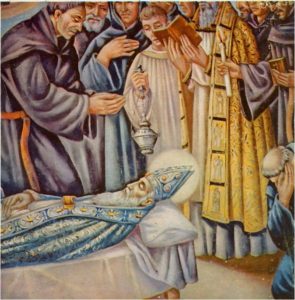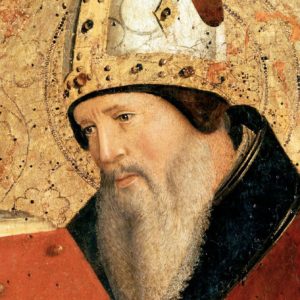 Saint Augustine’s death was indirectly at the hands of a heretic Christian.
Saint Augustine’s death was indirectly at the hands of a heretic Christian.
The city of Hippo Regius was 1000 years old by the time Augustine became its bishop. It was the second largest port in North Africa, after Carthage. The main part of the city was built on two hillocks, where the mouth of the Seyhouse River formed a good harbor. Most of Augustine’s parishioners would have been farmers on the river plain, growing grapes, olives and grains. North Africa in Augustine’s time, less dry than it is today, was the breadbasket of the Roman Empire.
Augustine’s time as bishop was far from strife-free right from the start. The Church in North Africa was still fighting the Donatist heresy, and the city’s suburbs were threatened from time to time by semi-nomadic tribes from the south.
But the gravest, and final, threat first made itself known in 428. The Vandals originated in Eastern Europe, but were settled in Spain by the early 5th century. In 428, for obscure reasons, their king Genseric took his army of 80,000 across the strait of Gibralter. By the standards of the time, they swept rapidly eastward across North Africa, overrunning the colonies of Mauretania and Numidia. The Roman armies simply collapsed and retreated before them. Bishops and citizens fled their towns. Churches were set on fire. Captives were tortured, and women suffered the usual fate of women in wartime. By the winter of 430, the Vandals reached Hippo. By May, they had surrounded the city and their fleet blocked the port.
The interesting thing about Genseric and his horde is that they were Christian.
Genseric was an Arian, another of the many early Christian heresies with origins in dogmatic, disputatious North Africa. The Arian heresy was simply that the Son and the Father were not co-eternal, that God the Father created his Son Jesus at a point in time. This ran completely counter to the Trinitarianism that was becoming orthodoxy in the early Church. Augustine grieved over the suffering of his Hippo flock, but by all accounts he never even considered surrender. Anyone who survived a Vandal attack was converted at sword-point, and Augustine believed his parishioners would be better off dead than converted to heresy.
In his own case, the choice was taken out of his hands. Saint Augustine died a few months into the siege, on August 28, 430. He was 75. The cause of death is usually described as “a fever,” probably brought on or compounded by stress and starvation.
The siege itself continued for a total of 14 months. Interestingly, sources disagree as to whether the city finally surrendered or whether Genseric simply abandoned the project and moved on.

 The summer before I started ninth grade was the summer when my family was poor. We were poor in a new 3-bedroom ranch house in a tidy little development, so we had to be secretly poor, but we were poor nonetheless. My father had finally drunk himself out of a job and now spent his days drinking Fort Pitt beer in front of TV soap operas, disintegrating in front of our eyes, 40 years old and already gaunt with hairless legs and a patchy scalp. My mother took a job. She was 35, weighed less than 100 pounds, looked younger than I did, and must have seemed out of place in front of her IBM Selectric, a tiny pre-adolescent supporting a family of five.
The summer before I started ninth grade was the summer when my family was poor. We were poor in a new 3-bedroom ranch house in a tidy little development, so we had to be secretly poor, but we were poor nonetheless. My father had finally drunk himself out of a job and now spent his days drinking Fort Pitt beer in front of TV soap operas, disintegrating in front of our eyes, 40 years old and already gaunt with hairless legs and a patchy scalp. My mother took a job. She was 35, weighed less than 100 pounds, looked younger than I did, and must have seemed out of place in front of her IBM Selectric, a tiny pre-adolescent supporting a family of five.